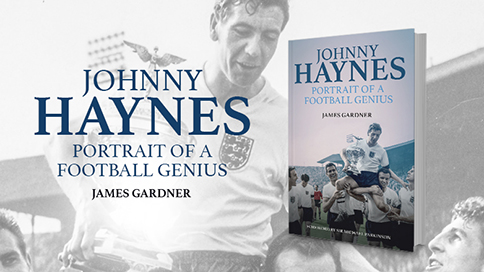
HOW FOOTBALL SHOULD BE PLAYED
HOW FOOTBALL SHOULD BE PLAYED
Johnny Haynes: The Portrait of a Football Genius is the biography of one of England’s greatest ever footballers – a player described by Pele as “the greatest passer of a ball I have ever seen.”
He was capped 56 times, 22 as captain, including the 9-3 hammering of the Scots at Wembley in 1961. He succeeded Dennis Compton as the ‘Brylcreem Boy’. When he became the first £100-a-week player it cemented his celebrity superstar status as the David Beckham of his day. Haynes only ever played for one professional club and finished his playing career in South Africa. He retired into relative obscurity and lived the last 20 years of his life in Edinburgh before tragically dying in a car accident in 2005.
In his obituary, James Lawton wrote, “Haynes was still the beginning and end of how football should be played. He had the wit to change the way the game was understood and played in this country.” His fascinating life story is told through his family, ex-teammates, famous journalists and celebrities as well as his fans.
Read Johnny Haynes: The Portrait of a Football Genius, and you will discover:
- Why Bobby Charlton believed that to receive a pass from Johnny Haynes was pure pleasure
- How a car crash almost finished his career when he was captain of England
- The truth about his relationship with Alf Ramsey – and why he was omitted from the 1966 World Cup Squad
- Why he was arrested in South Africa after a complaint by an elderly female neighbour
- What he did in the ‘Swinging Sixties’ as a football superstar – and the time a famous knighted actor mistook him for a boxer
- Why Haynes never played for a major club, despite twice being voted Britain’s top player by the readers of Charles Buchan's Football Monthly
- How a famous journalist once almost made him fall 200 feet from a window sill
- Why he never received any honours from the Queen, unlike other great players of his era
- How Johnny almost caused a riot in Rome after an England victory in the early 60s
Click here for more information, or to read a sample from Johnny Haynes.


